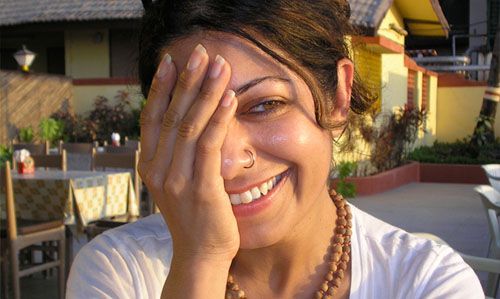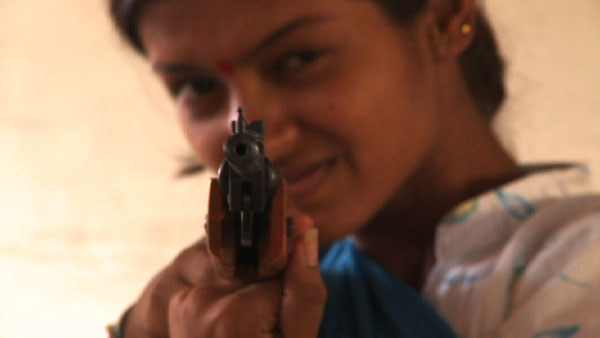 Back to selection
Back to selection
Director Nisha Pahuja on The World Before Her
India-born, Toronto-bred Nisha Pahuja’s beautiful and poignant The World Before Her won the World Documentary Competition Award at Tribeca Film Festival, where it premiered a few weeks ago. And while Pahuja grew up and lives in Toronto, she still has a fascination for her homeland. The World Before Her is her third film, after Diamond Road and Bollywood Bound, and her second dealing with India. It presents two sides of the country. For one segment of the film, Pahuja’s crew follows 20 “Miss India” contestants as they endure the pageant’s controversial month-long training regimen. The audience accompanies the women on every step of this boot camp, from Botox injection sessions to photo shoots. Pahuja focuses on three pageant hopefuls who are living a dream but who are also pushed into a new world and taken away from the patriarchal society they know. Ruhi is one of the competitors who has the chance to be supported by her family.
Pahuja’s crew was also the first allowed to follow the extreme training of young girls by Durgha Vahini, a militant fundamentalist. The girls are “brainwashed” and learn how to fight against Muslims, Christians and also against Western values in general. At the camp, the crew followed Prachi, a strong and determined young Hindu woman willing to teach an “anti Gandhi” ideology to those around her.
With powerful images and interviews, The World Before Her explores major changes in a country moving from its traditional roots to its role as a global powerhouse.

Filmmaker: Where did the idea for the film come from?
Pahuja: The idea actually originated from myself, and one of my producers, a guy named Ed Barreveld. I though it would be very interesting to make a film about the “Miss India,” the beauty contest, and use the pageant as a prism through which we explore a country that’s going through major cultural changes. And to [look at] how women are an active part of this change, and are also used to create an idea of India.
Then I started to read about the opposition to beauty pageants in general in India. The whole beauty pageant industry has really mushroomed since 1994, and there’s been a backlash against them. The opposition comes from two key players: the feminist movement that has a very strong voice, and the Hindu fundamentalist movement. Both of them are opposed to the pageant, but primarily for very different reasons. I decided to [depict] those two other stories so that what I was really looking at was, in some ways, the creation of a new Indian identity, and what people wanted for this country, which was clearly an ongoing economic and cultural change. When I started to get into the research and I started to meet the fundamentalists, they became so fascinating that I thought, “They can’t just be a sidebar story, they have to have an equal voice.” For me, as many global forces as there are in the world today, the two key ideologies that are governing present-day reality are capitalism and fundamentalism. I thought it would be very interesting to see how those two were playing out in a country like India and how women were at the frontline of this battle.
Filmmaker: This was the first time a camera crew had access to the camp of Durga Vahini. How did you get this authorization?
Pahuja: I wanted to explore the world of the fundamentalists, and I wanted to do it in a way that was not sensationalist, or wasn’t painting them in a bad light. I think we need to understand where those people are coming from. Once I realized I really wanted to understand them, and spend time with them, and essentially get access to this camp, I knew that I was going to have to really get them to open up and trust me. In order to that that, you have to be in India, you have to be on the ground. You can’t just make phone calls from Toronto. People need to see you. People need to know that you are serious. So I spent a lot of time in India. I basically went back and forth between Toronto and India — Bombay primarily. And I started to spend time with people and meet people from various levels within the movement. Eventually they started to trust me, and then they basically agreed to give me access. And through that, Prachi and her father were very helpful.
Filmmaker: You spent a lot of time in the extremist all-girl camp. How were your crew’s relations to the head of the camp?
Pahuja: I’ll tell you what happened. It took me two years to get access. And once I got in, after the first day of shooting, we lost access. Basically, they tried to shut us down. It was really something. You can imagine — we were devastated. And what happened is that there was a man, one of the heads of the camp, who was not informed that we were going to be there. And he freaked and got really anxious and very upset. The government was trying to shut them down and the fundamentalists were getting a lot of bad press, so it wasn’t a wise thing for them politically to let me in. Somehow, we managed to placate him, but what it meant was our access became limited. The real brainwashing sessions, the real “dark stuff”, we were not allowed to film. We were specifically told that there were certain lectures, certain events that we were not able to film. But all of us were living with these people. And they were just people, so you develop these relationships with them and they become fond of you and you become fond of them. In terms of being a woman, it’s a funny thing in that context sometimes in India, because they have a difficult time completely respecting you and understanding you. Especially as a woman who is in her forties and is not married and does not live at home with her family; all of these things kind of make them suspicious. Then I think there was also a sense of admiration. They kind of admire the fact that you are doing this as a woman. And also they feel less threatened because you’re a woman. It works against you and it works for you. It’s kind of double edged.
Filmmaker: You talked about “dark stuff,” in terms of lectures. What do you mean by that?
Pahuja: The real hatred that is spread in terms of how they should feel about Muslims, about Christians. There was one session where they actually talked about beauty contests, and “Miss India” in particular, and why these things had to be stopped, why they should not be allowed, why girls should not participate in them. There is this thing now in India called a “Love Jihad.” The Hindu fundamentalists are accusing Muslims of kidnapping Hindu girls, or seducing Hindu girls and marrying them, and having children so that the Muslim population increases in India. You lose Hindu numbers through this process. This whole “Love Jihad” thing was one of the big things they were teaching these girls to be aware of, and to avoid the Muslim men. What they really are doing is spreading those rumors and creating this kind hatred between the Muslims, the Christians and the Hindus, saying that the Muslims and the Christians are the enemies of the Hindus, and Westernization is evil.
Filmmaker: On the “Miss India” beauty pageant side, you focus on Ruhi, one of the competitors. How did you choose the beauty pageant contestants you interviewed?
Pahuja: I actually followed a few girls who instinctively I thought were going to win, because you want to end with a crown, right? I kind of had a sense of who the winner was going to be, so actually all the three girls who win, I followed them. And [Ruhi] happened to be the most interesting of the three. Ruhi is just a spark. She has just got that light, and she is funny, she’s warm, she and her parents are extremely open, and we became very close. Not all the girls were open with me, but I think Ruhi was maybe the most open, the most willing to share what was going on with her during that process. “She wears her heart on her sleeve” is what my editor Dave [Kazala] kept saying.
Filmmaker: There is obviously one winner. What will be the future for the others?
Pahuja: Because the training that they give you in “Miss India” is considered the best in the country, it just gives you a certain kind of discipline and people in the fashion world, in the movie world want to work with you. Because it’s such a hugely popular contest and because it has such a huge television audience, it gives everyone who wins exposure, it gives you a leg up, whether you lose or not. So a lot of these girls actually do quite well. Ruhi, for example, has had big parts in a few small films and she’s doing modeling, so it does work in your favor. It’s best if you win, of course! (laughs)
Filmmaker: In your opinion, what is the future of “Miss India” in a country in which major cultural changes are happening and at the same time fundamentalism is on the rise?
Pahuja: In most parts of India, not all parts of India, [fundamentalism] could easily emerge again as a very strong political voice. Now what’s very frightening about the fundamentalists are some of the tactics they are using, which are basically terrorist attacks. That’s why they are considered so dangerous. In terms of “Miss India,” what it represents to me is a certain kind of Westernization but also a market economy. It represents capitalism, and that is a reality in India that is not going to go away anytime soon. So the pageant will continue to thrive. Traditionally, there were women who came very disadvantaged families who used that pageant — it was a way for these girls to get out of poverty and help their family. That’s starting to change. Now the girls seem to be coming from more middle-class backgrounds, they have a certain degree of education and they have to be able to speak English. So it’s becoming more of a class-based thing.

